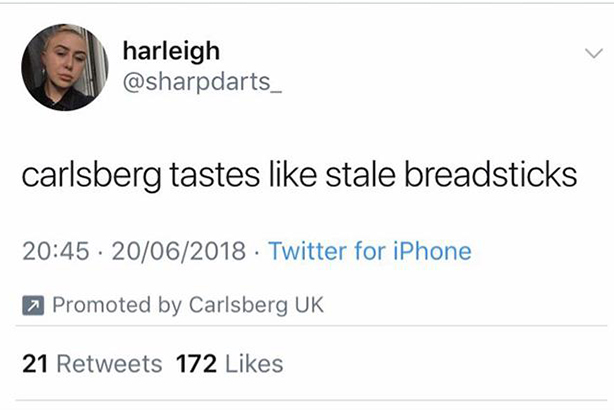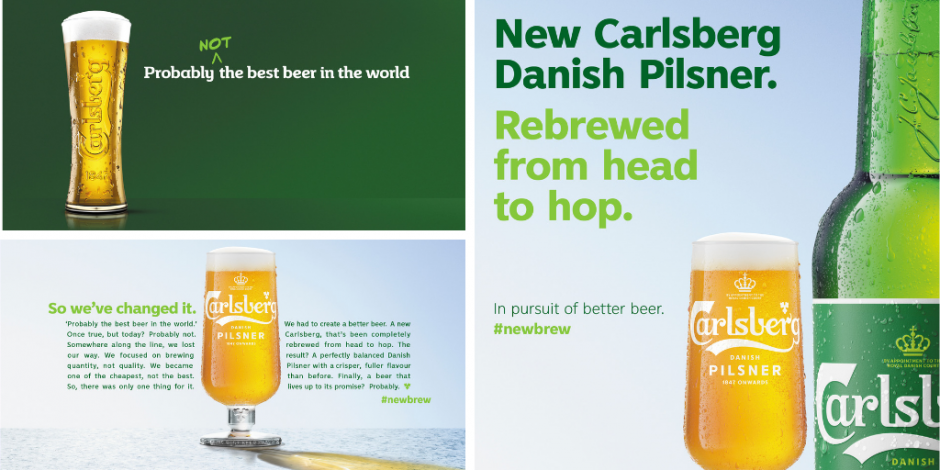Satirising 40 Years of Marketing Efforts
If you want to see an example of a marketing campaign that’ll get people talking, look to Carlsberg. The Danish brewery recently made the decision to scrap 40 years’ worth of marketing strategy efforts and turn them into satire.
This bold move has put Carlsberg onto the lips of pub-goers over what turned out to be a glorious Easter weekend for sitting out with a pint. The question though, is will it work?
Over the past 40 years

Some 40 years ago, Carlsberg UK received a pitch from the marketing agency, KMP. Part of this pitch was the cocky and now universally recognised tag-line ‘Probably the best lager in the world.’
Carlsberg loved it and ran with it. The tag-line formed the basis of their new campaign, part of which featured Orson Wells in an ad touting the perfection of the beer. The campaign as a whole, with its sarcastic edge, was a hit.
Thanks to its success, Carlsberg kept the line and the marketing strategy with little deviation for the next 4 decades, after all, if it ain’t broke don’t fix it.
Except it was a little broken, anyone who’s tasted Carlsberg knows full well that it’s anything but the best lager in the world. The beer became the favourite of people looking for something cheap to drink in large quantities, not because it tasted good.
The change came when Carlsberg realised this and in the midst of a changing beer culture which pushes better and better beer, they decided it was time for a change.
Strange beginnings
The first that anyone outside of Carlsberg saw of the new strategy was that the brewery had apparently done some Twitter trawling and maybe lost its mind.

Tweets, many from years ago, began to resurface as promoted by the brewery. This is nothing new, many brands sponsor organic tweets in an attempt to blend organic promotion with paid promotion.
The striking thing this time though was the nature of the Tweets: they weren’t exactly complimentary. Among the Tweets that resurfaced were comments that likened the beer to ‘naan bread’, ‘stale breadsticks’ and ‘piss’.
Even the uninitiated will know that generally when you’re trying to sell something you don’t publicise anything that compares your product to ‘piss’.

The Tweets were so negative that the audience’s first responses were to assume that Carlsberg was having something of an internal crisis, with some disgruntled marketing executive let loose on the social media.
As it kept happening though it became clear that this was anything but a crisis, it was a deliberate and planned strategy.
Going forward
After the initially odd beginnings, the brand released clips of their employees reading some of the tweets and having a laugh at their employer’s expense.

The idea behind all of this is to let consumers see that Carlsberg has realised what people think of their product. They’re satirising their own marketing materials.
Finally making things a little clearer, Carlsberg disseminated their new product campaign. This comes as part of an attempt to move the brand upmarket and admits their own failings:
“We focussed on brewing quantity, not quality. We became one of the cheapest, not the best.”
From here they go on to claim that they’ve seen the light and changed their ways, evolving the brewing process and creating a tastier beer. The beer is now no-longer labelled as simply ‘lager’, now it’s a ‘Danish Pilsner.’
Will it work?
The campaign must strike anyone as unorthodox, but it’s got people talking. Those sun-addled pub-goers will likely have at least tried a pint of the newer, smarter Carlsberg.
Another key factor is the bravery, when was the last time you saw a company publicise their own criticism?

Being brave in marketing is key, people don’t want to see just another cliched campaign about largely nothing, the idea is to catch consumer’s attention and Carlsberg have at the very least already achieved that.
“Bravery does not guarantee success, but without it you might as well go home and burn your marketing budget on the stove.” – Mark Ritton – Marketing Strategy Consultant
Carlsberg has devised a meticulously planned campaign that’s grounded in reality and centred around refreshing change, so on that basis, there’s a seriously strong chance that the new approach will be a hit.
A good deal of the possible success though hinges on whether Carlsberg has actually made a nicer beer, which only time and maybe a reduction in piss and bath water-themed tweets will tell.
To find out what an intelligent approach to marketing could do for you, contact Formation today.